I have 2 date values and a set of rows which have a range defined as discount_start_month and discount_end_month. The current situation is that I only have month information as below, there is no year data to compare the input 2 dates values with these months.
The goal is to take the date and see in between which range of months they fall into. At any given point of time they may fall into any of discount_code
For Eg: A date 01 January 2022 would come under DEC_JAN row.
A date 01 December 2021 would still come uder DEC_JAN row
Problem:
- The problem statement is without year information how would you check in which range do the input dates lie ?
- Once I figure out (1), I need to generate 2 dates with the values
advance_start_monthandadvance_end_month, so for the above it would be ,
2 dates would be named as startDateGeneration and endDateGeneration
startDateGeneration would be generated from the discount_code's advance_start_month,
considering example 01 January 2022, the startDateGeneration would be generated from DEC_JAN's advance_start_month and advance_end_month
day -> first day of the month of October (from advance_start_month)
Month -> October
Year -> Previous year
startDateGeneration would be 01 October 2021
Same for endDateGeneration, we would use the advance_end_month
so it would be 01 January 2022
Inputs are start date and end date.
Code to find the dates in range by iterating over the above dataset.
private static boolean isInRange(
LocalDate discountDate, Integer fromMonth, Integer toMonth) {
YearMonth fromMonthDiscount = YearMonth.of(discountDate.getYear(), fromMonth);
YearMonth toMonthDiscount = YearMonth.of(discountDate.getYear(), toMonth);
YearMonth yearMonthDiscountDate =
YearMonth.of(discountDate.getYear(), discountDate.getMonthValue());
if (fromMonth > toMonth) {
if (discountDate.getMonthValue() == Constants.DEC_MONTH) {
toMonthDiscount = YearMonth.of(discountDate.getYear() + 1, toMonth);
} else if (discountDate.getMonthValue() == Constants.JAN_MONTH) {
fromMonthDiscount = YearMonth.of(discountDate.getYear() - 1, fromMonth);
}
}
return (yearMonthDiscountDate.isAfter(fromMonthDiscount)
|| yearMonthDiscountDate.equals(fromMonthDiscount))
&& (yearMonthDiscountDate.isBefore(toMonthDiscount)
|| yearMonthDiscountDate.equals(toMonthDiscount));
}
Logic to find the problem statement (2) part,
int startYear = fromDate.getYear();
int endYear = toDate.getYear();
// Get the advance_start_month from the DB iterating object of the start date
int advanceStartMonth = ....
if(advanceStartMonth >= Constants.OCT_MONTH &&
advanceStartMonth <= Constants.DEC_MONTH &&
startYear == endYear) {
startYear = startYear - 1;
}
// Get the advance_start_month and advance_end_month from the DB iterating object of the end date
int discountResultStartMonth = //.......
int discountResultEndMonth = //........
if (discountResultStartMonth > discountResultEndMonth) {
if (toDate.getMonthValue() == Constants.DEC_MONTH) {
endYear = endYear + 1;
}
}
Logic for forming the dates to generate a range out of these,
fromDateSeasonMap -> Dataset for 1 row from the above dataset(for start date)
toDateSeasonMap -> Dataset for 1 row from the above dataset(for end date)
LocalDate startDateGeneration =
fromDate
.withMonth((Integer) fromDateSeasonMap.get(Constants.ADVANCE_START_MONTH))
.withYear(startYear);
LocalDate endDateGeneration =
toDate
.withMonth((Integer) toDateSeasonMap.get(Constants.ADVANCE_END_MONTH))
.withYear(endYear)
.withDayOfMonth(
YearMonth.of(endYear, (Integer) toDateSeasonMap.get(Constants.ADVANCE_END_MONTH))
.atEndOfMonth()
.getDayOfMonth());
Notes:
- At any given point of time there would be no overlapping months in the dataset.
- Only Months numerical data is present.
- There would be no values greater than 12 as there are only 12 months in a year.
Expected Input and output
Begin Input
Start Date: 2023-08-01
End Date: 2023-10-01
startDateGeneration: 2023-06-01
endDateGeneration: 2023-11-30
===================================
Begin Input
Start Date: 2023-09-01
End Date: 2023-12-01
startDateGeneration: 2023-07-01
endDateGeneration: 2024-01-31
===================================
Begin Input
Start Date: 2023-01-30
End Date: 2023-02-01
startDateGeneration: 2022-11-30
endDateGeneration: 2023-03-31
===================================
Begin Input
Start Date: 2023-01-30
End Date: 2023-02-01
startDateGeneration: 2022-11-30
endDateGeneration: 2023-03-31
===================================
Begin Input
Start Date: 2022-10-30
End Date: 2023-02-01
startDateGeneration: 2022-08-30
endDateGeneration: 2023-03-31
===================================
Begin Input
Start Date: 2022-08-30
End Date: 2022-10-01
startDateGeneration: 2022-06-30
endDateGeneration: 2022-12-31
===================================
Begin Input
Start Date: 2022-08-30
End Date: 2023-02-01
startDateGeneration: 2022-06-30
endDateGeneration: 2023-03-31
===================================
Begin Input
Start Date: 2023-04-30
End Date: 2023-07-01
startDateGeneration: 2023-02-28
endDateGeneration: 2023-07-31
===================================
Begin Input
Start Date: 2023-06-30
End Date: 2023-07-01
startDateGeneration: 2023-04-30
endDateGeneration: 2023-07-31
===================================
Begin Input
Start Date: 2023-08-30
End Date: 2023-10-01
startDateGeneration: 2023-06-30
endDateGeneration: 2023-12-31
===================================
Begin Input
Start Date: 2023-10-30
End Date: 2024-01-01
startDateGeneration: 2023-08-30
endDateGeneration: 2024-03-31
===================================
Begin Input
Start Date: 2022-12-30
End Date: 2023-02-01
startDateGeneration: 2022-10-30
endDateGeneration: 2023-03-31
===================================
Begin Input
Start Date: 2023-01-30
End Date: 2023-02-01
startDateGeneration: 2022-10-30
endDateGeneration: 2023-03-31
===================================
Begin Input
Start Date: 2022-10-01
End Date: 2023-02-01
startDateGeneration: 2022-07-01
endDateGeneration: 2023-03-31
===================================
Begin Input
Start Date: 2022-12-01
End Date: 2023-02-01
startDateGeneration: 2022-10-01
endDateGeneration: 2023-03-31
===================================
Begin Input
Start Date: 2023-02-01
End Date: 2023-04-01
startDateGeneration: 2022-12-01
endDateGeneration: 2023-05-31
===================================
Begin Input
Start Date: 2023-02-01
End Date: 2023-03-01
startDateGeneration: 2022-12-01
endDateGeneration: 2023-03-31
===================================
Begin Input
Start Date: 2023-04-30
End Date: 2023-06-01
startDateGeneration: 2023-02-28
endDateGeneration: 2023-07-31
===================================
Begin Input
Start Date: 2023-06-30
End Date: 2023-08-01
startDateGeneration: 2023-04-30
endDateGeneration: 2023-08-31
===================================
